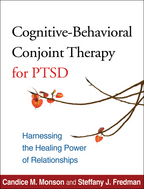Cognitive-Behavioral Conjoint Therapy for PTSD
Harnessing the Healing Power of Relationships
Candice M. Monson and Steffany J. Fredman
A Paperback Originale-bookprint + e-book
A Paperback Original
orderJuly 19, 2012
ISBN 9781462505531
Price: $47.00 239 Pages
Size: 8" x 10½"
Sign up for emails on upcoming titles on Trauma & PTSD (with special discounts)!
“PTSD, by definition, affects relationships. Even experienced clinicians will profit from the well-planned and well-researched treatment approach presented in this volume. The manual is incredibly user friendly, taking readers through the ABCs of couple treatment with session-by-session instructions, reproducible handouts, clinical examples, and suggested dialogue. The authors are experts who address all the nuances and co-occurring problems we see with PTSD. This book should be on the shelf of everyone who works with adults with PTSD—they will offer better treatment for it.”

—Barbara Olasov Rothbaum, PhD, ABPP, Professor of Psychiatry, and Director, Emory Healthcare Veterans Program and Trauma and Anxiety Recovery Program, Emory University School of Medicine
“Monson and Fredman provide an optimistic, strength-based approach to a challenging clinical condition; their focus on interpersonal factors significantly advances treatment of PTSD. The authors’ clinical expertise in engaging patients and their significant others in a clearly defined, empirically supported treatment program shines through in this highly readable and practical work. The richly detailed guidelines for each assessment and treatment session, sample scripts for explaining concepts and methods to the couple, numerous clinical tips for implementing the procedures, and extensive handouts for clients make this one of the most user-friendly treatment manuals I have ever read. Having this volume on your bookshelf is like having wise clinical supervisors on hand.”

—Norman B. Epstein, PhD, Department of Family Science (Emeritus), University of Maryland, College Park
“Monson and Fredman have created an essential resource for clinicians who treat trauma survivors, expanding the frame from individual and group therapy to the key—yet too often overlooked—domain of intimate relationships. The manual provides a complete template for working with couples struggling with PTSD. It addresses critical relational issues (such as blame, closeness, and trust) and shows how to teach clients invaluable practical skills for getting not only themselves, but also their relationships, 'unstuck' from PTSD.”

—Julian D. Ford, PhD, ABPP, Department of Psychiatry, University of Connecticut Health Center
—Barbara Olasov Rothbaum, PhD, ABPP, Professor of Psychiatry, and Director, Emory Healthcare Veterans Program and Trauma and Anxiety Recovery Program, Emory University School of Medicine
“Monson and Fredman provide an optimistic, strength-based approach to a challenging clinical condition; their focus on interpersonal factors significantly advances treatment of PTSD. The authors’ clinical expertise in engaging patients and their significant others in a clearly defined, empirically supported treatment program shines through in this highly readable and practical work. The richly detailed guidelines for each assessment and treatment session, sample scripts for explaining concepts and methods to the couple, numerous clinical tips for implementing the procedures, and extensive handouts for clients make this one of the most user-friendly treatment manuals I have ever read. Having this volume on your bookshelf is like having wise clinical supervisors on hand.”
—Norman B. Epstein, PhD, Department of Family Science (Emeritus), University of Maryland, College Park
“Monson and Fredman have created an essential resource for clinicians who treat trauma survivors, expanding the frame from individual and group therapy to the key—yet too often overlooked—domain of intimate relationships. The manual provides a complete template for working with couples struggling with PTSD. It addresses critical relational issues (such as blame, closeness, and trust) and shows how to teach clients invaluable practical skills for getting not only themselves, but also their relationships, 'unstuck' from PTSD.”
—Julian D. Ford, PhD, ABPP, Department of Psychiatry, University of Connecticut Health Center



